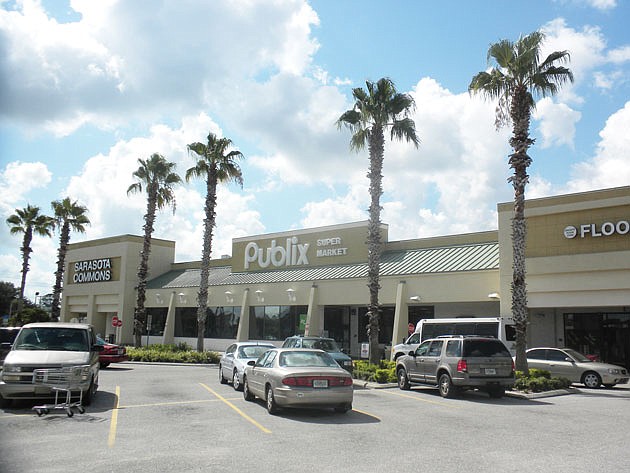- November 24, 2024
-
-
Loading

Loading

Commodore Realty Inc. has built a successful Florida retail portfolio of close to 1 million square feet over the past 40 years by acquiring what it calls “low-risk investments.”
But in an age when online shopping and e-commerce purveyors such as Amazon are growing exponentially, is there still any such thing?
Commodore founder and CEO Max Puyanic believes there still is.
Retail, the head of the Key Biscayne-based company says, is an ever-morphing business where change is a constant to be grappled with continually.
“I see change as all part of the evolution of retail, and evolution is a good thing,” Puyanic says.
Commodore, which owns a handful of assets in Sarasota totaling 415,000 square feet, has had its share of grappling over the years.
Puyanic recalls that in 1994 when he first acquired the Sarasota Commons shopping center, at 965 Beneva Road in Sarasota, the center was anchored by a Luria & Son jewelry store, an august chain that had been around for nearly a century. In 1997, Luria had filed for bankruptcy and shuttered all its locations — including at Sarasota Commons.
Puyanic rebounded by re-leasing the Luria space to the U.S. Postal Service, which continues to operate today from within the 158,000-square-foot center.
More recently, Commodore's Sarasota Crossings complex razed an underperforming 41,000-square-foot movie theater and replaced it with 51,000 square feet of new space, occupied by Office Depot and HHGregg — only to have the discount electronics retailer go dark there a few years later.
“They were a great tenant, and it's a shame that we'll now have to re-rent that space, but guess what? We will,” Puyanic says. “We've been down this road before.”
Moreover, Puyanic says he embraces the change.
“We've always taken the attitude that change is good, because new tenants come with better ideas,” he says.
He doesn't seem particularly afraid of the threat that online shopping from the likes of giant Amazon or others pose, either.
“The internet will play a role in everyone's future,” Puyanic says. “I'd certainly be unhappy without it. But many people see the internet as a sea change for retail, and I don't. I'm not trying to diminish the role of online, but there are many factors that are going to be playing a role in the retail of the future.
“There's too much money out there, from hedge funds and alike, and as a result, there's too many people buying things that they don't know how to run, and that becomes a bigger problem,” Puyanic says. “I think a prime example of that can be found in Sears and Kmart.”
And despite potential disruptions from bankruptcies, closures or evolving technology, Puyanic contends the business of selling goods and services from centers will continue unabated.
“I don't see doom and gloom,” he says. “I see different types of tenants that will take the place of others, I see poor operators and good operators. That's the nature of retail.”
Puyanic moved to Florida from Chicago, where his father worked in the real estate industry, to attend law school at the University of Miami in the late-1960s.
Shortly after graduating and passing his bar exam in 1972, Puyanic opened his own firm and began practicing law — and investing in income-producing properties.
At first, he dabbled in apartments in the Miami area, before expanding with capital from some high-net worth investors to cattle farms, fruit groves and retail centers.
Commodore's first retail investment came in 1989, when the company bought Tavernier Towne Center, a Winn-Dixie-anchored center in the Florida Keys.
Puyanic was so drawn to retail properties that he ultimately sold his other investments to focus on the sector.
“I really liked the experiential nature of retail,” he says. “And I also liked having New York Stock Exchange and other creditworthy merchants as customers and tenants, in part because they provided an ability to obtain longer-term financing.”
In the early 1990s, during a tour of the state seeking properties to buy, Puyanic discovered Sarasota.
In the years since, Commodore has acquired the 136,000-square-foot Bird Bay shopping center, in Venice; a 4,054-square-foot storefront on St. Armands Circle, in Sarasota; and a 47,867-square-foot grocery store occupied today by Winn-Dixie, in the Palmetto section of Manatee County, together with Sarasota Commons and Sarasota Crossings.
In all, the company today owns 10 retail properties totaling 900,000 square feet.
Key tenants include Publix Super Markets Inc., Winn-Dixie, Save-A-Lot, Big Lots, CVS, DaRuMa Japanese Steakhouse, the U.S. Postal Service and Office Depot, among others.
Puyanic says he also expects to start acquiring again in the near future.
“The business growth cycle has been going on 10 years now, and I see some weakness,” he says. “I think we're coming into a time when there will be buying opportunities, either of retail or other property types, such as office or even residential.
“We're also looking for budding new markets to enter around the state, the way Sarasota was 25 years ago. Florida is a state of continual growth, so we like to buy here.”